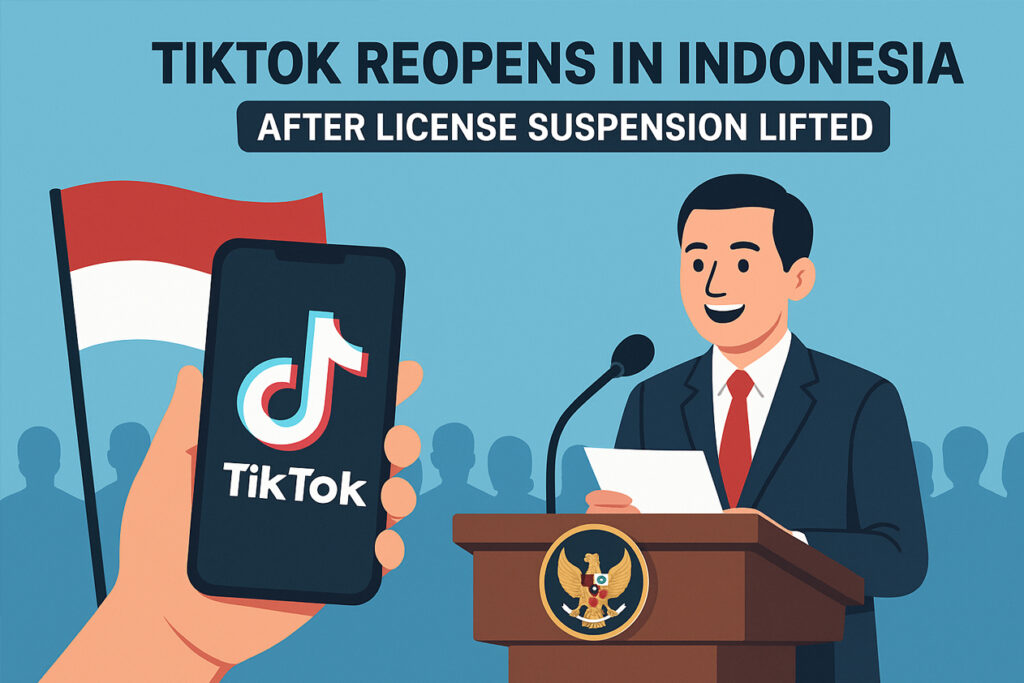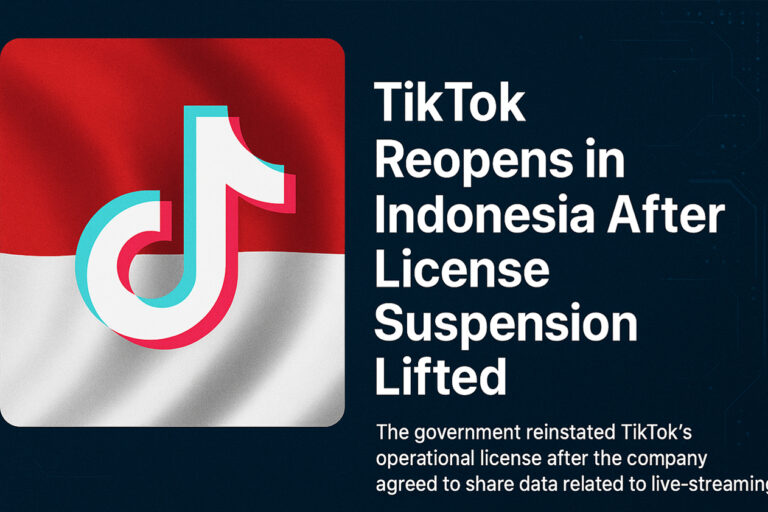Premium Biz Post – After months of government scrutiny, TikTok Reopens in Indonesia After License Suspension Lifted. This marks a major shift for the social media giant and Indonesia’s fast-growing digital industry. The government reinstated TikTok’s operational license after the company agreed to share data related to live-streaming during recent national protests. The case reflects rising tensions between innovation, regulation, and data control in Southeast Asia’s biggest online market.

Background: Why TikTok Was Suspended
Earlier this year, Indonesia’s Ministry of Communication and Information Technology (Kominfo) suspended TikTok’s operations. The reason was non-compliance with local data laws and unmonitored live-streaming that allegedly fueled social unrest.
Authorities said TikTok failed to store user data inside Indonesia, violating national data localization rules. Concerns also grew over unverified live streams during large-scale protests. In response, ByteDance, TikTok’s parent company, held several meetings with Kominfo. The company finally agreed to provide controlled access to live-streaming data and user activity logs from verified accounts.
This decision allowed the government to lift the suspension and restore TikTok’s license.
Balancing Compliance and Freedom
The TikTok case highlights the challenge of balancing national security and digital freedom. The Indonesian government said its actions were not meant to suppress creativity but to ensure transparency.
Minister of Communication Budi Arie Setiadi explained, “We support innovation, but digital platforms must obey local laws and protect citizens’ data.”
Critics, however, fear the move gives too much power to the state. Human rights groups worry about possible misuse of private user data. Still, many Indonesians agree that regulation is needed to stop misinformation and harmful online content.
The debate shows a growing awareness of how social media influences society and politics.
TikTok’s Response: Local Adaptation
TikTok quickly adjusted its strategy to align with government rules. The platform introduced a new compliance program focused on transparency and data governance.
The company also announced plans to build a local data center in West Java. All user information from Indonesia will be stored and processed locally.
TikTok Indonesia’s spokesperson, Dina Octavia, said, “We respect Indonesia’s laws and are committed to cooperation. Our goal is to empower creativity while keeping users safe.”
The platform is also investing in digital literacy programs. It partners with local fact-checkers to fight misinformation and improve online safety. These initiatives are designed to rebuild trust among users and authorities alike.
Read More : ”Soapstone Carving DIY Kit Discovering Art and Patience Through Stone”
Economic Effects of TikTok’s Return
TikTok’s reopening brings relief to millions of Indonesian users, creators, and small businesses. Before the suspension, Indonesia was one of TikTok’s largest markets, with over 125 million active users.
Many small entrepreneurs relied on TikTok for online sales and promotion. Data from the Indonesian E-Commerce Association (idEA) shows that TikTok Shop accounted for about 15% of total social commerce transactions in 2024.
When the ban took effect, digital sales dropped sharply. Many creators lost income, and small brands struggled to reach customers.
Now, with TikTok back online, experts expect a quick rebound. A report from e-Conomy SEA predicts Indonesia’s digital economy will surpass US$100 billion by 2026. TikTok is expected to play a key role in driving that growth.
Content creator Aisha Ramadhani, known for her fashion videos, said, “TikTok is my business, not just entertainment. The suspension hurt many of us. Now we can create freely again.”
New Rules for Transparency
TikTok’s license renewal comes with new oversight rules. The platform must now submit quarterly reports to Kominfo. These reports will include details on content moderation, partnerships, and algorithms.
The government can also conduct random audits to ensure TikTok complies with the Personal Data Protection Act (UU PDP).
Analysts say this approach could become a model for regulating digital platforms in Southeast Asia. Other countries, such as Malaysia and Vietnam, are studying similar frameworks to protect user data.
However, experts also warn that excessive data-sharing demands could discourage foreign investment. Too much control might make global tech firms hesitant to expand in Indonesia. Finding a middle ground will be essential for maintaining both security and innovation.
Regional Impact: A Lesson for ASEAN
TikTok’s experience in Indonesia is influencing other nations in the region. As the largest digital economy in ASEAN, Indonesia often sets policy trends for its neighbors.
Across Southeast Asia, over 400 million people use the internet daily. Data protection and platform accountability are now critical issues.
ASEAN leaders are developing a regional data framework to support safe cross-border information exchange. Indonesia’s firm stance on data governance could shape that initiative.
Digital policy expert Dr. Nurul Hidayah said, “TikTok’s case is about more than one platform. It defines how Southeast Asian governments handle the balance between innovation and control.”
Rising Awareness of Data Ethics
Beyond business and politics, TikTok’s suspension raises questions about digital ethics. Millions of users depend on social media for income, news, and expression. This makes data security more important than ever.
TikTok has faced scrutiny worldwide, especially in the U.S. and Europe, over privacy concerns. The company insists that data from each country is processed under local laws.
In Indonesia, the new agreement ensures that all data is stored locally, with access monitored by national authorities.
This episode has sparked new public interest in digital rights. Many experts are urging the government to support data literacy programs. Users must understand how their information is collected and used online.
Rebuilding Trust
TikTok’s return marks the start of a new chapter for Indonesia’s digital ecosystem. It shows that cooperation between global platforms and local governments is possible.
Indonesia, with its young and tech-savvy population, remains one of the most influential digital markets in Asia.
TikTok’s compliance with data rules sets a new example for other companies seeking long-term success in regulated environments.
By focusing on transparency, localized data management, and responsible innovation, TikTok aims to rebuild user trust and government confidence.
Still, challenges remain. As technology evolves, debates about privacy, freedom, and digital control will continue.
TikTok’s reinstatement is a rare win-win moment. The government proved its ability to enforce digital laws, while TikTok demonstrated adaptability and respect for national regulations.
The event highlights an important truth: trust and accountability are the foundations of a healthy digital future.
As Indonesia strengthens its digital framework, the TikTok case may become a model for how nations can protect users, encourage innovation, and maintain sovereignty—all at once.



